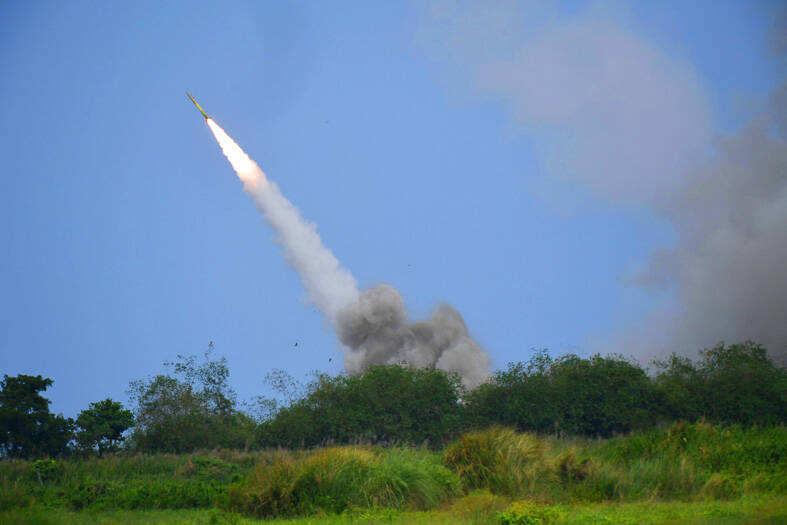Twenty-nine sets of M142 High Mobility Artillery Rocket Systems (HIMARS) that the military purchased from the US in 2020 and 2022 are to be delivered in different batches between the end of this year and 2026, based on the military’s plan.
International demand for HIMARS has been high after it has helped Ukraine hit long-range targets with precision in its war with Russia. Before the Russian invasion of Ukraine, the US government had agreed to sell 11 sets of HIMARS to Taiwan after it was confirmed that M109A6 howitzer artillery weapons would not be available to procure
The military later purchased 18 more sets of HIMARS.

Photo: AFP
The second procurement package, which cost approximately NT$32.5 billion (US$1 billion), also includes 84 MGM-140 army tactical missiles and 864 rockets.
Based on the military’s plan, the first order of 11 sets of HIMARS is to be delivered between the end of this year and next year, while the remaining sets would be delivered before the end of 2026.
The US Defense Security Cooperation Agency (DSCA) on Friday last week said that the US Department of State had approved the sale of 16 sets of HIMARS to Norway. The arms sales package, which topped US$580 million, also included 15 sets of M30A2 multiple rocket pods, 15 sets of M31A2 multiple rocket pods and 100 MGM-140 pods, as well as logistics, training and technical support.
Both M30A2 and M31A2 rockets are guided by GPS, making them more accurate in hitting their targets than traditional rockets.
Their maximum shooting range is about 92km.
The M30A2 rocket is designed with submunitions, while the M31A2 rocket is equipped with a single high-explosive warhead. The MGM-140 missiles purchased by Norway not only have a range of up to 300km, but also have a very high accuracy, with a circular arithmetic error of only 9m.
The Norwegian government had earlier this year announced that it would increase its defense spending to 600 billion kroner (US$55.7 billion) over the next 12 years, adding that its defense budget would reach 1.624 trillion kroner by 2036.
The arms package “will support the foreign policy goals and national security objectives of the US by improving the security of a NATO ally that is an important force for political stability and economic progress in Europe,” the DSCA said.
“The proposed sale will improve Norway’s capability to meet current and future threats and enhance its interoperability with US and other allied forces. It will also enhance Norway’s artillery and mid-range fire capability,” the agency said, adding that it would not alter the military balance in the region.

CHAOS: Iranians took to the streets playing celebratory music after reports of Khamenei’s death on Saturday, while mourners also gathered in Tehran yesterday Iranian Supreme Leader Ayatollah Ali Khamenei was killed in a major attack on Iran launched by Israel and the US, throwing the future of the Islamic republic into doubt and raising the risk of regional instability. Iranian state television and the state-run IRNA news agency announced the 86-year-old’s death early yesterday. US President Donald Trump said it gave Iranians their “greatest chance” to “take back” their country. The announcements came after a joint US and Israeli aerial bombardment that targeted Iranian military and governmental sites. Trump said the “heavy and pinpoint bombing” would continue through the week or as long

TRUST: The KMT said it respected the US’ timing and considerations, and hoped it would continue to honor its commitments to helping Taiwan bolster its defenses and deterrence US President Donald Trump is delaying a multibillion-dollar arms sale to Taiwan to ensure his visit to Beijing is successful, a New York Times report said. The weapons sales package has stalled in the US Department of State, the report said, citing US officials it did not identify. The White House has told agencies not to push forward ahead of Trump’s meeting with Chinese President Xi Jinping (習近平), it said. The two last month held a phone call to discuss trade and geopolitical flashpoints ahead of the summit. Xi raised the Taiwan issue and urged the US to handle arms sales to

State-run CPC Corp, Taiwan (CPC, 台灣中油) yesterday said that it had confirmed on Saturday night with its liquefied natural gas (LNG) and crude oil suppliers that shipments are proceeding as scheduled and that domestic supplies remain unaffected. The CPC yesterday announced the gasoline and diesel prices will rise by NT$0.2 and NT$0.4 per liter, respectively, starting Monday, citing Middle East tensions and blizzards in the eastern United States. CPC also iterated it has been reducing the proportion of crude oil imports from the Middle East and diversifying its supply sources in the past few years in response to geopolitical risks, expanding

Pro-democracy media tycoon Jimmy Lai’s (黎智英) fraud conviction and prison sentence were yesterday overturned by a Hong Kong court, in a surprise legal decision that comes soon after Lai was jailed for 20 years on a separate national security charge. Judges Jeremy Poon (潘兆初), Anthea Pang (彭寶琴) and Derek Pang (彭偉昌) said in the judgement that they allowed the appeal from Lai, and another defendant in the case, to proceed, as a lower court judge had “erred.” “The Court of Appeal gave them leave to appeal against their conviction, allowed their appeals, quashed the convictions and set aside the sentences,” the judges